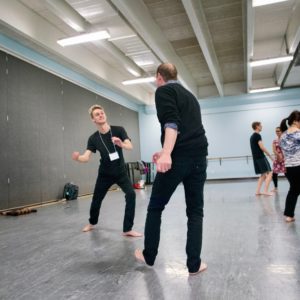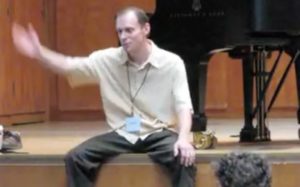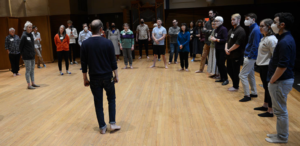
Quick Reactions with a Dalcroze Teacher: Stephen Neely
In this second in our series of teacher profiles, I caught up with Carnegie Mellon professor and director of the CMU Marta Sanchez Dalcroze Teacher Training Center, Stephen Neely.
Michael Joviala: Hi Stephen! Give us your Dalcroze origin story in 50 words or less.
Stephen Neely: Oh, wow. 50 words? Ok, I’ll try. I was an undergraduate voice major at Carnegie Mellon and I was required to take 4 semesters of eurhythmics. The professor was Marta Sanchez and then eventually Annabelle Joseph. Around my junior year, Marta seemed to think that I was decent enough to pay attention to. There was an opening in the children’s preparatory school for a eurhythmics teacher, and Martha said, “You should do it”. She just threw me into the fire! And the rest is history.
Michael: I had a similar experience when I started, although I threw myself into the fire! It’s like how we used ride in cars with no seat belts. Somehow we survived! What’s something that’s unique and defining about your teaching?
Stephen Neely: I don’t think this is necessarily a good thing, but I do talk more than most Dalcroze teachers that I know. I’m know a little yappy at times, but I believe it’s useful when I’m trying to tie firsthand primary bodied experience to larger philosophic awareness. I’m interested in the ways our musicianship is on display both on and off the main stage. My first passion is stage performance. It is so powerful when we can recognize how stage performance is a special curated version of the life we wish we were leading. If I could just get the rest of my life to be as magical, musical and ideal, what a perfect life I would have! I think that the reason we perform and go to see performances, is that we’re looking for these little glimmers, these little slices of perfection. Quite often in the theater or the live stage we can witness it. I try to tie that in to my teaching, and so those kinds of pairings are maybe something that’s unique to me.

Stephen’s Teaching
Michael: Name a superpower that you have as a teacher.
Stephen: I have the “long game,” and the older I get, the bigger a superpower I think that may be. I can be patient and trust that things are going to work out. The joke in my marriage is that I’m the optimist. “Stephen thinks it’s all going to work out.” But that’s how I have to run my day! If I believed otherwise, I wouldn’t be able to go on. I have no trouble believing that my students are evolving toward better ends. If we all just keep showing up, things are just going to keep getting better.
Michael Joviala: How about a superpower of a colleague that you wish you had?
Stephen: I wish I had a better solfège ear. I signed up for extra, then double, and even triple-extra solfege training over the years, because I knew I was weak. And I’m a singer! I can memorize anything, the weirdest stuff. I can memorize it fast if I just cycle through it a handful of times. I can lock it in no problem. But if you want me to sight-read it or “inner-hear” it? I wish I were better at that. So many of our colleagues are just masterful at it.

Teaching Internal Feeling
Michael: Is there a musical subject that you’d like to work with in a class but haven’t yet?
Stephen: I don’t actually title my classes unless I’m at a workshop and they make me give it a title. But there is one theme that I’ve been playing with that I haven’t quite found the right word for. It was originally taught to me as inner hearing. At some point, somebody gave it a fancy name: audiation. I don’t dispute it in the least. It is a real thing! But I think there’s a big opportunity in our circles to realize that there is not only inner hearing, there is also inner feeling. I’ve been experimenting with the wording ‘interoceptive motion’. If there’s internal audio, what’s the internal sensation of motion? It could be paired to solfège settings, but also all kinds rhythmic settings, or really anything that’s musical. Your indigestion is interoceptive, as is, for example, the pressure on your chest when you feel sad or when you feel dread. ‘Interoceptive motion’ would be feeling the need, the yearning or the shifting from here to there. I feel it inwardly, and so I can pair that with pitch and melody. Melody is, of course, pitches that are just frequencies, and, yes, I can imagine those frequencies. I can hear them statically, but I also can align them in melody in a way that feels directional. And then I can notice that this not only ‘sounds’ to me, it ‘moves’ to me, or ‘feels’ to me. It is the motion part that ‘wants’ to resolve. There are two different attentions: pitch and motion. I think there’s a way to be aware of both. How nice it is to have them integrated!
Michael: It sounds to me like your conception is about personal experience and bringing personal experience to awareness.
Stephen: Yes, and that’s very close to my definition of musicianship.

Musicianship / Artistry
Michael: Ok, what’s your definition of musicianship?
Stephen: Music education at large is broken up into three things that I used to get confused: technique, literacy, and musicianship. A first attention of music education is technique. As a singer, it includes things like making my voice sing the F sharp reliably every time I want it. Technique is what allows your instrument to behave and do the thing it’s supposed to do. It’s your embouchure, your agility. For singers, it’s the posture and the breath, the soft palate placement, etc. The second attention of music education is literacy, which is just anything you can name. Musically literate people don’t have to actually be in performance to look at a score and point at a thing. They can look and see that that’s a major third, or that’s diminished chord, or they can find the recapitulation of the A section.
Neither of these are actually required to make some kind of music. There are people who have no literacy to speak of, that is, they don’t know how to name anything, but they’re amazing musicians. Likewise, you can make high art with very limited technique. Maybe you just can’t make a lot of it, or a wide range of it, but you could be really good a on thing, say, the one key of your harmonica. I can play in one key and in one style. I’m a one-trick pony, but man, I’m good at the one trick!
But for me, the third attention of music education, musicianship, is the most exciting. It is the choosing, the awareness, the being present when we are making music. I can sing a song with no musicianship: all the right pitches with perfect intonation, good rhythm, and I can even tell you about it. But it doesn’t actually mean that I felt it, or that I took ownership of it. It doesn’t mean that I crafted it.
Michael: Musicianship for you is more like artistry.
Stephen: Yes. Other people will want the word musicianship to mean all 3 at once. I don’t dispute that, but the way I’ve been using those 3 terms is to try to separate the actual making of music, so I like the word musicianship to be this artistry component. You’re not making music yet until musicianship enters the recipe. Then you’ve got the complete thing.
Non-musical musings
Michael: If you didn’t end up becoming a Dalcroze teacher, what do you think you might have done?
Stephen: Growing up, I knew I was a teacher. I didn’t know until my senior year of high school that I was going to be a music teacher. I thought maybe I’d do elementary education, maybe math. I also like to build stuff and play in my wood shop, so I could very well have been a shop teacher. I’d have been good at that, and would have enjoyed it. Actually, I would enjoy it. That might be my retirement!
“Make it Music”
Michael: Tell me about the book you’ve recently published with Anthony Molinaro.
Stephen: Sure! It’s a short book, 120 pages or so, and it is not at all claiming to be a comprehensive Dalcroze pedagogy text. Anthony and I met for a year and just talked about what made us excited, and we came up with two things that we thought would be valuable for Dalcroze-interested teachers. One of them was “open-ended lesson planning.” When we teach, we want to show up well prepared with a good lesson plan, but we don’t want to teach the script. If the only thing I did was hit all the bullets on my on my script it wouldn’t fall under the Dalcroze mindset as Anthony and I believe it to be. Instead, I want to be present with my students to see what are they offering. How could they have challenged my preconceived ideas to help us go some place that they needed to go rather than where I decided we were going to go? So there are accompanying card decks that point at ways to challenge our preconceived ideas. Can you develop reflexivity and live in the moment? We are thinking about some public school settings where you’ve actually screwed up if you teach something that’s not on your lesson plan! We want to be a counter voice for those classrooms, so we spend a bunch of time talking about that.
And the second thing we talk about is the ‘teaching artist’ title. As a singer, it’s easy to feel like I’m an artist, but it took me quite a few years to realize that teaching is an art in itself. So we try to convince you that you’re allowed to call teaching your art, and that you should flex your muscles like an artist. You should be creative. You should be present. You should be in ensemble. You should challenge yourself. You should stretch and take risks. The things that define artistry should be present in your classroom with you. We built these card decks as a way to practice that.
Michael: Sounds like a valuable resource. Thanks for talking to me today!
Stephen: My pleasure! Thanks for the conversations. It is always a joy to talk with you.
Stephen Neely, PhD, the Milton and Cynthia Friedman Assistant Professor of Music, Director of Graduate Studies, and Director of the Carnegie Mellon Marta Sanchez Dalcroze Training Center, Carnegie Mellon University School of Music, lectures and presents workshops in the fields of design, music, architecture, and pedagogy. He is the co-founder of the Virtual Dalcroze Meet-Up and past president of the Dalcroze Society of America. He enjoys traveling to present hands-on workshops around the globe on the overlaps between music, design, the body, aesthetics, performance, and experience.
The DSA thanks the many Dalcroze educators who have changed lives through their work. Please, tell us about the educators who have inspired you or consider a donation to the DSA to support their legacy.